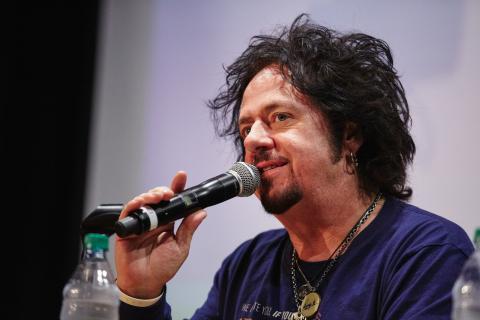Guitarist Steve Lukather on Keeping the Faith and the Groove

Guitarist Steve Lukather speaks at the Berk Recital Hall on October 22.
Dave Green
“I’m a little nervous, so bear with me. I’m not used to doing this,” Steve Lukather said as he settled into a chair on the stage in front of a packed room at the Berk Recital Hall. It was a somewhat surprising admission from a man who is no stranger to stages, having played stadiums as the guitarist for Toto, the chart-topping band known for singles like “Rosanna” and “Africa,” toured with Ringo Starr, and laid down tracks with everyone from Aretha Franklin to Barbra Streisand.
But within minutes Lukather, a visiting artist for the Guitar Department, had the room rapt as he told stories of how he started in a high school band and later found himself in studios with the biggest names in the industry.
Take, for example, the Michael Jackson story. Jackson’s album Off the Wall had made the gloved one a superstar by the early 1980s. One morning during this time, Jackson called Lukather to see if he’d play rhythm guitar on a new song called “Beat It.” Lukather picked up the phone, gave Jackson unprintable advice, and hung up on him.
“Why would Michael Jackson call me on the phone? I got a lot of sick friends that do impressions,” Lukather said. He couldn't believe that Jackson would call him. Minutes later, Jackson called back. Lukather repeated his obscene suggestion and hung up again.
“So I keep hanging up on this guy, telling him to [get lost]. And I get a call about 10, 11 o’clock that day; it’s Quincy’s [Jones] house. He goes, ‘No, that was really Michael. You should probably call him back.’” Ashamed, Lukather called Jackson and apologized. Jackson, he said, told him not to worry; he gets that a lot.
Or take the Frank Zappa story: the avant-garde musician had assembled a roomful of guitarists at a cattle call and chose Lukather, who was just a teenager, for the first audition. Zappa asked him to play an incredibly difficult piece of music and when Lukather, shaking, struggled to execute it, Zappa announced, in front of 200 other guitarists, “You have very poor comprehension. Next!”
Lukather felt destroyed and completely humiliated as he walked out of the door. Then he noticed the room was emptying out behind him. It was only years later that Lukather learned that this is what Zappa did: he found a sacrificial lamb to intimidate the others and weed out the room. Lukather promised himself that he’d get better and show Zappa one day.
“You get punched in the face and you get up and go, ‘Thank you, may I have another?’ You have to have that attitude to see this through into a real career and make it … Don’t fall for the ‘no, no, no.’ It doesn’t exist except for in here,” Lukather said, pointing to his head. “Believe me, they said no to me a lot of times when I was young, but I wouldn’t listen.”
From ‘No’ to ‘Yes’
However, there were also a good deal of yeses. One of the earliest came from a fellow high school student named Steve Porcaro who had a hot band in the area. Porcaro took Lukather into his band while his older brother, Jeff Porcaro of Steely Dan, mentored them.
Listening to Jeff, Lukather learned the importance of groove. “No matter what style of music, if you don’t swing, you don’t groove, it’s pointless.” The way to develop this is to play with other musicians, he said. “You gotta get out and play with other cats. And I think (that) you being in this environment, where there’s so many great musicians in the school, playing together in different styles” is an advantage, he said.
Jeff Porcaro continued to influence Lukather’s music and the direction of his career. In 1977, Lukather and the Porcaro brothers formed Toto with three other musicians. The band became one of the top-selling groups over the next several years and, in 1982, won a Grammy Award for Record of the Year for “Rosanna.” The group’s other smash song, “Africa,” was such an unexpected success that Lukather said he’d run down Hollywood Boulevard naked if it was a hit.
Unlike the promise he made to himself about Zappa, this was one he didn’t keep.
